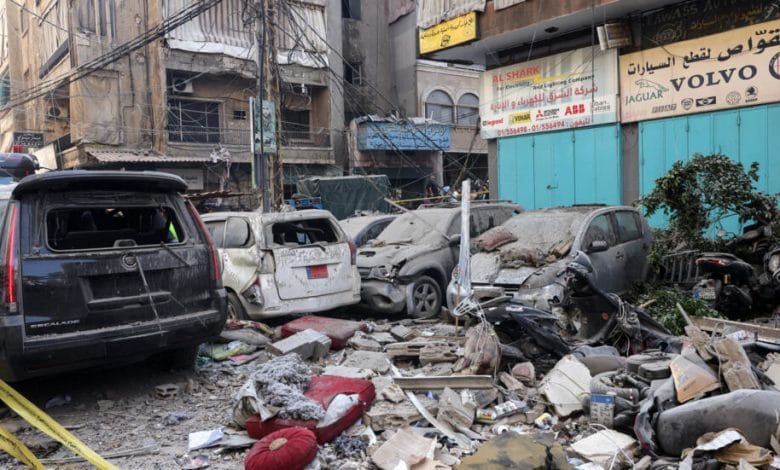### العدوان على لبنان: التأثير على الاقتصاد الكلي والواقع الاجتماعي
أجرى موقع **Leb Economy** دراسة حول الآثار الاقتصادية والاجتماعية للعدوان الإسرائيلي على لبنان بالتعاون مع عميد كلية إدارة الأعمال في الجامعة الأميركية للتكنولوجيا، الخبير الاقتصادي **د. بيار الخوري**. سيتم نشر الدراسة على مرحلتين، حيث تغطي المرحلة الأولى تأثير الضربات العدوانية على الاقتصاد الكلي والتأثير الاجتماعي للحرب، في حين ستتناول المرحلة الثانية واقع الاقتصاد اللبناني بعد الحرب والسياسات الاقتصادية المطلوبة للتعافي.
#### الوضع الاقتصادي الراهن
أوضح صندوق النقد الدولي في بيانه الأخير أن الوضع الاقتصادي في لبنان واهن، وهو ما يتوقع أن يزداد سوءًا نتيجة الحرب، مما سيتسبب في خسائر كبيرة وتدمير البنية التحتية. لذا، يبقى السؤال: كيف ستؤثر الضربات على القطاعات الاقتصادية المختلفة، وما هو مستقبل الوضع الاقتصادي بعد الحرب؟
في هذا السياق، أشار **د. بيار الخوري** إلى أن بيان صندوق النقد الدولي يعكس الحالة الحساسة والهشة التي يمر بها لبنان. ويعاني الاقتصاد اللبناني منذ سنوات من أزمة مالية خانقة، بينما النظام الاجتماعي يتآكل نتيجة الأزمات المتعددة، مثل أزمة اللاجئين السوريين، وجائحة كورونا، والانهيار المالي في 2019. وقد زادت الضربات العدوانية من تعقيد الوضع بشكل غير مسبوق.
#### التأثيرات الاقتصادية للعدوان
– **البنية التحتية**: تضررت المنشآت الحيوية مثل الجسور والطرق ومحطات الطاقة، مما يزيد من تعقيد عملية إعادة الإعمار وارتفاع كلفتها. سيتسبب ذلك في انخفاض القدرة الإنتاجية للبنية التحتية، مما سيؤثر سلبًا على قدرة الاقتصاد على التعافي.
– **القطاعان الزراعي والصناعي**: سيتعرض لبنان لنقص في الإمدادات الغذائية نتيجة تدمير المناطق الريفية وقطاع الزراعة، مما سيزيد الاعتماد على الاستيراد ويضغط على ميزان المدفوعات. كما سيتأثر القطاع الصناعي بشدة نتيجة تدمير المصانع وشبكات الإمداد، مما يؤدي إلى فقدان الوظائف وزيادة البطالة.
– **التضخم وارتفاع الأسعار**: ستؤدي الأضرار المادية وقلة الموارد إلى زيادة الطلب على السلع الأساسية. ومع تراجع الإنتاج المحلي وارتفاع تكاليف الاستيراد، سترتفع معدلات التضخم بشكل أكبر، مما يزيد العبء على الأسر الفقيرة.
– **القطاع المالي والمصرفي**: كان النظام المالي اللبناني في حالة انهيار قبل العدوان، ومع استمرار الأزمة، سيتعرض القطاع المصرفي لضغوط إضافية بسبب الحاجة إلى تمويل إعادة الإعمار. تعاني البنوك اللبنانية من أزمة ثقة، ومع تفاقم الوضع الاقتصادي والأمني، سيكون من الصعب استعادة الثقة، مما يزيد من الاعتماد على الدولار وتحويل الأموال إلى الخارج.
#### التأثيرات الاجتماعية للحرب
– **الفقر والبطالة**: من المتوقع أن تتفاقم مستويات الفقر والبطالة بشكل كبير. قبل العدوان، كان أكثر من 80% من السكان يعيشون تحت خط الفقر، ومع تزايد النزوح الداخلي وتدمير مصادر الدخل في المناطق المتضررة، سيزداد هذا الرقم بشكل كبير.
– **الهجرة الجماعية**: نتيجة لليأس من الأوضاع الاقتصادية والمعيشية، سيشهد لبنان موجة جديدة من الهجرة الجماعية للعائلات والشباب بحثًا عن فرص أفضل في الخارج، مما قد يؤدي إلى “نزيف عقول” يضر بإعادة الإعمار.
– **الضغط على الخدمات العامة**: ستزيد الزيادة في النزوح الداخلي من الضغط على الخدمات الصحية والتعليمية، التي تعاني بالفعل من التدهور. من المتوقع أن تواجه المستشفيات والمدارس صعوبات في تلبية احتياجات السكان المتزايدين، مما يعزز الأزمة الاجتماعية.
### الخلاصة
إن تأثير العدوان الإسرائيلي على لبنان يتجاوز الخسائر المادية إلى تداعيات اقتصادية واجتماعية عميقة. إذ يتطلب الوضع المتدهور استجابة عاجلة وفعالة من المجتمع الدولي لضمان دعم لبنان في مرحلة التعافي وإعادة الإعمار.
#### المصدر: ايفا ابي حيدر – Leb Economy
### Aggression Against Lebanon: Impact on the Macro Economy and Social Reality
**Leb Economy** conducted an analysis on the economic and social repercussions of the Israeli aggression against Lebanon, in collaboration with **Dr. Pierre Khoury**, Dean of the Faculty of Business Administration at the American University of Technology. The analysis will be published in two phases, with the first phase addressing the impact of the aggression on the macro economy and the social effects of the war, while the second phase will discuss Lebanon's post-war economic reality and the necessary economic policies for recovery.
#### Current Economic Situation
The recent statement from the **International Monetary Fund** emphasized the fragile economic situation in Lebanon, which is expected to worsen due to the war, resulting in substantial losses and damage to infrastructure. Hence, the question remains: how will the strikes affect various economic sectors, and what is the future of the economic situation post-war?
In this context, **Dr. Pierre Khoury** noted that the IMF's statement reflects the sensitive and precarious state Lebanon is experiencing. The Lebanese economy has suffered from a significant financial crisis for years, while the social system has deteriorated due to multiple crises, including the Syrian refugee crisis, the COVID-19 pandemic, and the financial collapse in 2019. The current aggressive strikes have further complicated the situation in unprecedented ways.
#### Economic Impacts of the Aggression
– **Infrastructure**: Vital facilities such as bridges, roads, and power stations have been destroyed, complicating the reconstruction process and raising costs. This damage will lead to a decline in the infrastructure's productive capacity, adversely affecting the economy's ability to recover.
– **Agricultural and Industrial Sectors**: Lebanon will face a food supply shortage due to the destruction of rural areas and the agricultural sector, increasing reliance on imports and putting pressure on the balance of payments. The industrial sector will also suffer from factory destruction and supply chain disruptions, leading to job losses and increased unemployment.
– **Inflation and Rising Prices**: Physical damages, combined with resource shortages, will increase demand for essential goods. However, due to declining local production and rising import costs, inflation rates will soar, exacerbating the cost of living for impoverished families.
– **Financial and Banking Sector**: The Lebanese financial system was already in a state of collapse prior to the aggression, and with the crisis ongoing, the banking sector will face additional pressures due to the need for reconstruction financing. Lebanese banks suffer from a crisis of confidence, and as the economic and security situation deteriorates, restoring trust will be challenging, further increasing reliance on the dollar and transferring funds abroad.
#### Social Effects of the War
– **Poverty and Unemployment**: Poverty and unemployment levels are expected to significantly worsen. Before the aggression, over 80% of the population lived below the poverty line, and with the worsening conditions and increased internal displacement, this number will rise dramatically.
– **Mass Migration**: Driven by despair over the economic and living conditions, Lebanon will likely witness a new wave of mass migration of families and youth seeking better opportunities abroad, leading to a “brain drain” that hampers reconstruction efforts.
– **Pressure on Public Services**: Increased internal displacement from affected areas will heighten pressure on already deteriorating healthcare and educational services. Hospitals and schools will likely struggle to meet the needs of the rising population in safer areas, exacerbating the social crisis.
### Conclusion
The impact of the Israeli aggression on Lebanon extends beyond material losses to profound economic and social repercussions. The deteriorating situation necessitates urgent and effective responses from the international community to ensure support for Lebanon in the recovery and reconstruction phases.
translated by economyscopes team
Source: Eva Abi Haidar – Leb Economy
 سكوبات عالمية إقتصادية – EconomyScopes إجعل موقعنا خيارك ومصدرك الأنسب للأخبار الإقتصادية المحلية والعربية والعالمية على أنواعها بالإضافة الى نشر مجموعة لا بأس بها من فرص العمل في لبنان والشرق الأوسط والعالم
سكوبات عالمية إقتصادية – EconomyScopes إجعل موقعنا خيارك ومصدرك الأنسب للأخبار الإقتصادية المحلية والعربية والعالمية على أنواعها بالإضافة الى نشر مجموعة لا بأس بها من فرص العمل في لبنان والشرق الأوسط والعالم




